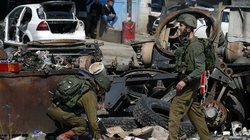 A Palestinian teenager has been seriously injured after an Israeli settler ran him over in the southern part of the occupied West Bank.
A Palestinian teenager has been seriously injured after an Israeli settler ran him over in the southern part of the occupied West Bank. RAN - “Ays Mahmoud Houshiyeh, 16, from the city of Hebron [al-Khalil] was run over by an Israeli settler while he was walking down the city’s main street” on Friday, Ibrahim Abu Zara, governor of al-Khalil’s Yatta municipality, told Anadolu news agency.
Palestinians in the West Bank are the target of frequent attacks by Israeli settlers.
In recent years, Israeli settlers have been frequently caught on camera vandalizing Palestinian farms in the West Bank and stealing their olive harvest.
Palestinians say the thefts and vandalism occur mainly on Palestinian land near settlements that they can only reach by coordinating ahead of time with the Israeli military.
Most of the attacks carried out by Israeli settlers against Palestinians and their property are met with impunity, with those guilty rarely facing consequences for such actions.
Rights groups, including Yesh Din and B’Tselem, have on several occasions slammed the regime in Tel Aviv for failing to protect Palestinians from settler violence or investigate attacks.
Israel occupied the entire West Bank, including East Jerusalem al-Quds, during full-frontal military operations in 1967.
Following the 1967 war, the law was applied to East al-Quds to enable Tel Aviv to confiscate homes of the Palestinians who are not "absent" or "missing" but live in so-called adversarial territories.
Israel forces Palestinian man to demolish own house
In a separate development, Israeli authorities forced a Palestinian man to demolish his own house in the occupied Old City of East Jerusalem al-Quds.
Local sources reported that Nabeeh al-Basity was forced to demolish his house on Saturday.
#Breaking
Palestinian child has been reported seriously injured after being deliberately run over by a settler's car northern Hebrew.
— Hanthala News Agency (@HanthalaNews) April 5, 2019
Al-Basity said that his home was built in 1999 and was 65 square meters, adding that the city council decided three years ago to demolish the property, which lacked a construction license.
The demolition was carried out upon an order by the Israeli municipality of the city that claimed the property “caused damage to the archeological aspect on the Old City.”
Al-Basity had been summoned by the municipality of the city and was ordered to demolish his own house or face very high fines and fees.
Palestinians living in occupied East Jerusalem al-Quds are regularly forced to demolish their own houses upon orders by the Israeli municipality of the city to avoid paying exorbitant demolition fees to the municipality.
Furthermore, Israeli authorities frequently demolish Palestinian buildings and structures in the so-called Area C, with Bedouin and herding communities being particularly vulnerable to that practice.
Area C, which is under full Israeli control, makes up more than 60 percent of the entire occupied West Bank. Eighty-eight percent of the area lies in the strategic Jordan Valley, which comprises a third of the West Bank.
Since 1967, the Israeli regime has been enforcing the draconian policy of demolishing the houses of Palestinians it deems to be behind fatal attacks against Israeli settlers. The practice, however, was temporarily halted from 2005 to 2014, with the exception of 2009, when scores of homes were sealed and razed in East Jerusalem al-Quds.
More than half a million Israelis live in over 230 settlements built since the 1967 Israeli occupation of the West Bank and East Jerusalem al-Quds. Built on occupied land, the settlements are internationally condemned as illegal.
The UN Security Council has condemned Israel’s settlement activities in the occupied territories in several resolutions.
Palestinians want the West Bank as part of their future independent state with East Jerusalem al-Quds as its capital.
847/940